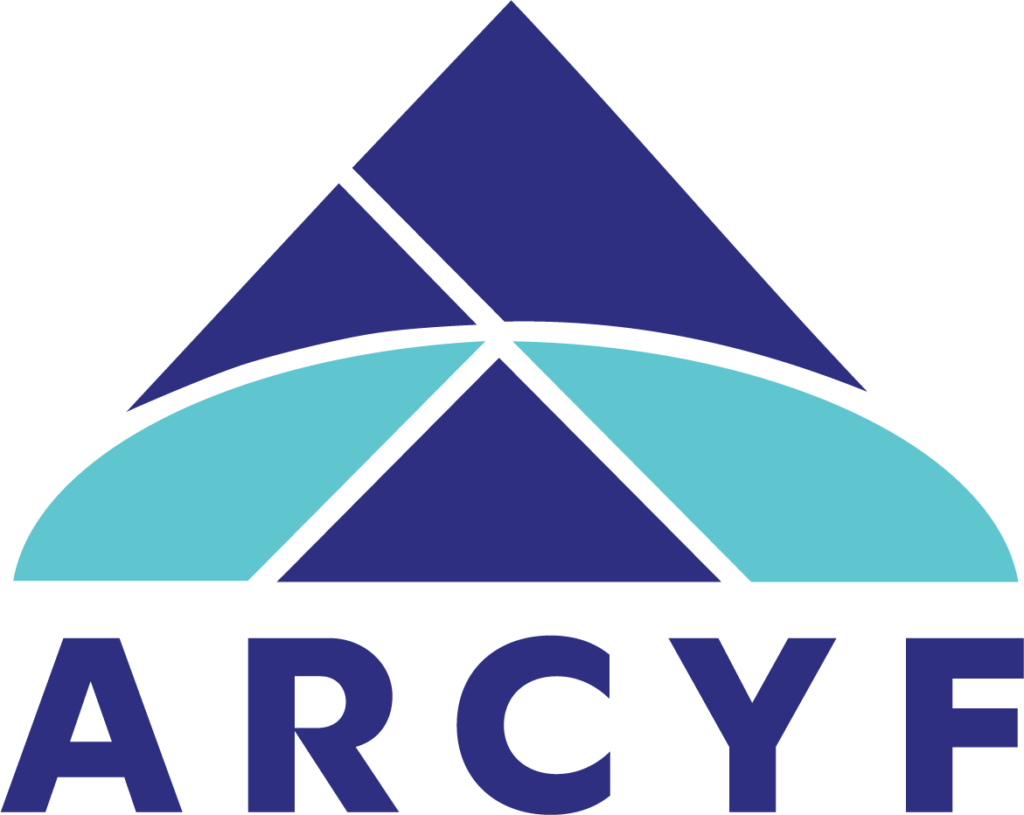Program Overview
The Arctic Resilient Communities Youth Fellowship (ARCYF) hosted its final in-person workshop for the 2023 cohort in Yellowknife, Canada, January 11-14, 2024. As one of three workshops conducted across the Arctic during the year-long fellowship (Anchorage, Alaska, and Sisimiut/Nuuk Greenland hosted the previous events), young leaders from the rural regions of each country (Alaska, Canada, and Greenland) participated in a five-day immersive experience where they explored their cultural heritage, shared their insights and knowledge about the issues faced by their respective communities, and bonded through skill-building activities.
Thanks to funding from Global Affairs Canada and Alaska Airlines, the Yellowknife, Northwest Territories, Canada gathering (see the complete list of the 2023 ARCYF cohort here) enabled the fellows to supplement their regular online training through in-person discussions, seminars, and meetings on a range of Arctic issues with leading experts from diverse backgrounds, including Indigenous and non-Indigenous Arctic community leaders, local business professionals, government representatives, academics and others working in Arctic social research.
Held on Akaitcho Bay, on the shores of Great Slave Lake at BDene Adventures, a Dene-owned and operated camp just outside Yellowknife, Northwest Territories, Canada, the final workshop focused on connecting with the local Yellowknives Dene First Nations, engaging in cultural exchanges among Arctic and northern communities, and celebrating the hard work and dedication of the 2023 cohort as demonstrated by their fellowship graduation.
This review offers day-to-day takeaways from events, summaries of discussions, reflections on the fellows’ overall experience, and recommendations for enhanced youth engagement. As ARCYF concludes its inaugural year and program coordinators look forward to the second year’s cohort, these workshop reviews offer a celebration of program successes, an acknowledgment of shortcomings, and guidance for the program’s continued improvement.
Fellow Reflections and Insights
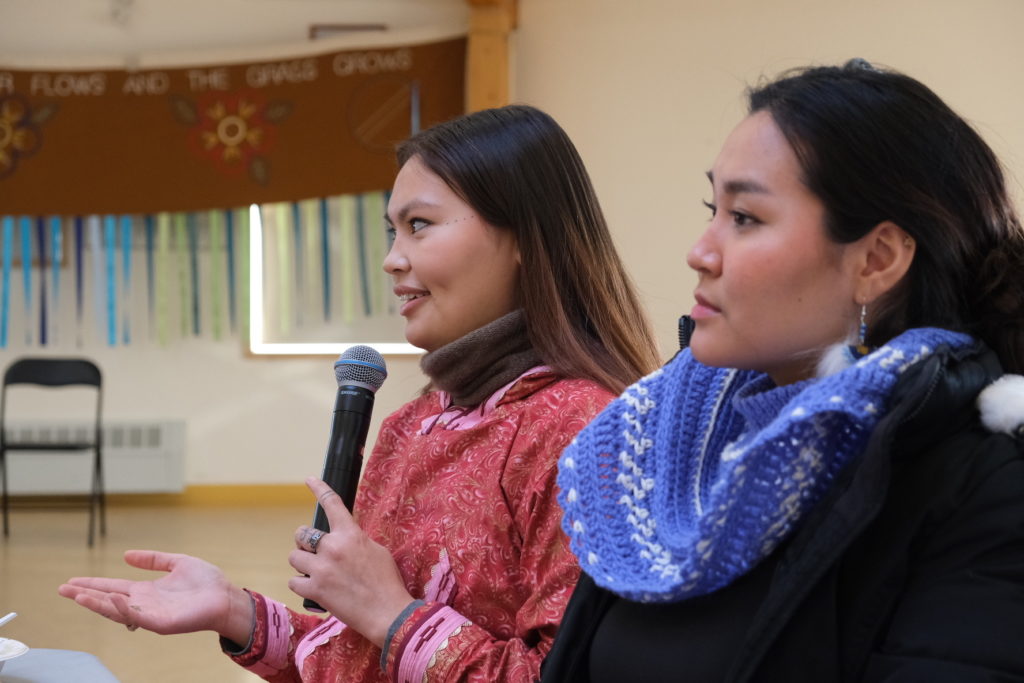
Sharing circles held at the workshop’s beginning and end offered reflection opportunities. ARCYF and other youth initiatives aim to improve the quality of interaction between youth, their communities, and their institutions. To this end, the fellows provided the following observations during the workshop, reinforcing feedback provided throughout the fellowship. pictured: Sierra Anderson, Miyuki Daorana
- Youth engagement efforts must be inclusive and representative of all young people by developing safe spaces for discussing issues relevant to them and their communities.
- Youth participation and engagement in leadership programs increase when they feel mutually respected and can fully trust those who facilitate the opportunity.
- Youth engagement is only successful if the knowledge and insight shared by youth are properly recognized and accredited. When this unique perspective is fully valued and validated, youth represent the power of new perspectives and feel a sense of contribution.
- The slogan “nothing about us, without us” reflects a need for Indigenous voices and self-determination when operating within Indigenous spaces, whether that action is academic, political, or economic.
- Indigenous societies and economics involve a mutual reliance, prioritization of help, and egalitarian care that ensures everyone is taken care of: a whole community effort is needed.
- Transgenerational Indigenous knowledge is a science that has played a vital role in community health and has helped Indigenous peoples thrive for thousands of years.
- Understanding food resources teaches values, makes people stewards of the land on which they live, and keeps communities culturally connected with the natural world.
- Participating in sessions and talks is good; leading sessions is even better!
- Building bonds among fellows through the workshops and the fellowship, in general, was one of the most important aspects.
Key Recommendations

As the inaugural year, ARCYF is evolving. Lessons learned and feedback generated from the Canada Workshop (as well as those recommendations gathered from the Alaska and Greenland workshops) are being considered and will be integrated into the development of future ARCYF programming. These recommendations represent the collective observations of staff, partners, local coordinators, and, importantly, the participants gathered through facilitated sharing circles and informal conversations. pictured: Hannah Neudorf, Nivi Rosing, and Samreen Ahmad
- Utilize the first cohort of fellows to guide the next cohort and incorporate their feedback into future planning activities.
- Dedicate the first day of the workshop to group bonding and social mixing to enhance the quality of interaction. This should also include a review and commitment to a shared community agreement that reflects the input of the fellows.
- Encourage collaborative leadership among fellows rather than passive listening by providing opportunities for youth to assume leadership roles in discussion-based activities. Prioritizing roles where fellows are at the forefront should be a key focus for all workshops. Provide opportunities for youth to assume leadership roles in discussion-based activities to encourage collaborative leadership among fellows rather than passive listening.
- Prioritize Indigenous participation in developing programming and workshops.
- Emphasize daily reflections and sharing circles following each day of workshop activities.
- Incorporate Inuit Qaujimajatuqangit, Dene Laws, and other traditional ways of knowing and value systems into programming.
- Create space for joy and celebration through cultural games and land-based activities.
- Offer detailed advance information about workshop programs, the individual fellows will meet, and program expectations, emphasizing the crucial role of fellows’ participation in the program’s success.
Canada Workshop Recap
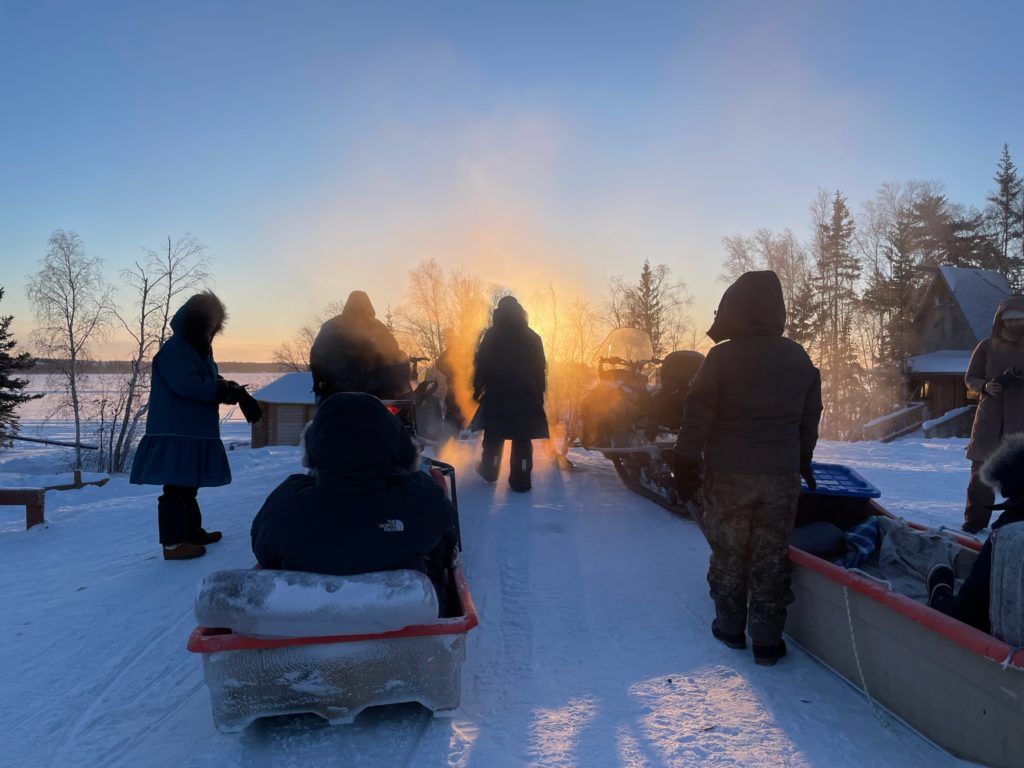
The following is a day-by-day recap of the ‘Canada Workshop’ activities and feedback provided by the ARCYF fellows.
Thursday, January 11, 2024- Extreme Cold Forces Change of Plans: Cultural Enrichment Prevails Indoors. Due to extreme cold, the group couldn’t visit BDene camp. With temperatures at -50℃, transportation and camp equipment couldn’t operate. Instead, they gathered at the Chateau Nova Hotel’s Lynx conference room. They engaged in workshops, games, and cultural activities led by Hovak Johnston. Local coordinators Tate Juniper and Randy Baillageron provided facilitation and cultural insights, ensuring the event’s success despite the weather challenges.
Friday, January 12, 2024- BDene Camp Welcomes Fellows: Safety Briefing, Project Workshop, and Cultural Exchange Highlight Day. With temperatures rising to a bearable -40℃, Bobby Drygeese, owner and operator of BDene camp, successfully got the equipment running, finally allowing the group to depart for BDene camp. Upon arrival, Bobby warmly welcomed the fellows and shared invaluable local knowledge and history about the Denendeh area. After settling into their cabins, Bobby and Randy Baillargeon conducted a comprehensive safety briefing to familiarize the participants with the risks associated with the extreme conditions, including essential instructions on operating the wood stoves. Tate Juniper and Jon Isaacs then led the fellows in an engaging projects workshop, facilitating the sharing of project updates and providing valuable insights from Tate on implementing personal community projects. The day concluded with more beading, a delightful sampling of local cuisine, and captivating storytelling sessions with Hovak Johnston.
Saturday, January 13, 2024- Ceremony Day: Celebrating Achievements and Cultural Exchange. The group began the day by transferring to the Chief Drygeese Center in Dettah for a day filled with festivities. Following lively games and karaoke, fellows engaged in a roundtable discussion led by Tate Juniper, focusing on community resilience, public speaking, and empowerment.
The day’s highlight was the graduation ceremony, honoring the dedication and hard work of the 2023 ARCYF cohort fellows throughout the program. The fellows received their well-deserved graduation certificates with an introduction from Jon Isaacs, Francesca Bray, and Ian Laing, followed by a reflective discussion on the program’s impact.
Later, fellows explored Yellowknife and its local galleries before returning to the Chief Drygeese Center for a captivating drumming demonstration by the Yellowknives Dene Drummers and engaging Dene hand games led by Bobby Drygeese, Tate Juniper, and Randy Baillageron. The evening concluded with more cultural activities, including beading, sampling of local delicacies such as frozen caribou (quaq) and Arctic char, and enchanting storytelling sessions with Hovak Johnston.
Sunday/Monday, January 14-15, 2024—Goodbyes and Reflections: Departure Day from BDene Camp. After a restful night, the fellows packed their cabins and tidied the main area in readiness for departure from BDene camp. In a touching gesture, Tate Juniper organized a reflective exercise in which fellows and staff wrote personal notes to each other to be cherished and read after their departure.
Following this, the group returned to the hotel in Yellowknife, exchanging heartfelt farewells before the first departing fellows embarked on their journey to the airport.
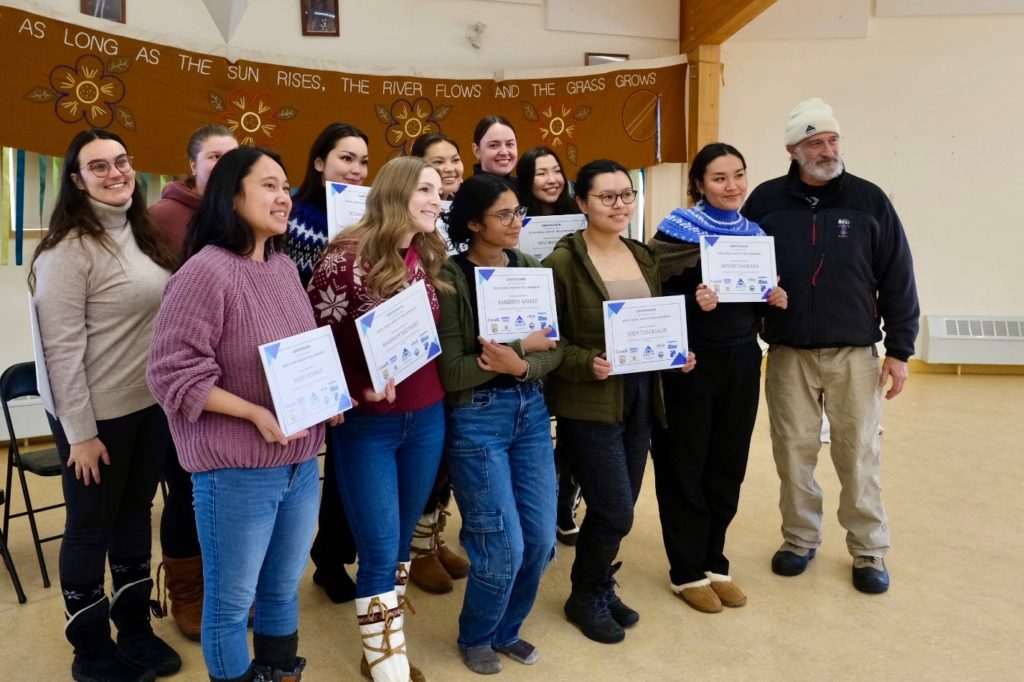
L to R: (top row) Francesca Bray, Amélie Aubrey Smith, Juliane Aronsen, Sierra Anderson, Tiana Lemon, Nivi Rosing, (bottom row) Sasha Rankin, Hannah Neudorf, Samreen Ahmad, Jody Tulurialik, Miyuki Daorana, Jon Isaacs.
Yellowknife Facilitators and Coordinators
- Bobby Drygeese, BDene owner-operator and knowledge holder. Bobby is a member of Yellowknives Dene First Nation.
- Tate Juniper, Western Arctic Youth Collective (WAYC) Co-Director and local coordinator/ facilitator for the ARCYF Canada Workshop. Tate is Sahtu Dene and a member of the Délı̨nę First Nation’s Band.
- Randy Baillargeon is a land-based educator, traditional knowledge holder with Dechinta, and a local coordinator/facilitator for the ARCYF Canada Workshop. Randy is a member of Yellowknives Dene First Nation.
- Hovak Johnston is an Inuk local raised on the land in the Kitikmeot Region of Nunavut until she was sent away to school. Hovak is a knowledge holder, storyteller, and artist.
Support Team
- Francesca Bray, ARCYF Program Manager
- Konkordia ‘Kunngu’ Sørensen Gabriel, Workshop Coordinator
- Hanna Eklund, Institute of the North, Workshop Coordinator
- Ian Laing, Institute of the North, Executive Director
- Jon Isaacs, Institute of the North, Board Chairman
- Veronica Slajer, North Star Group, Communities & Social Performance Advisor
- Elias Christian, North Star Group, Communications Specialist
- Gilbert Castellanos, U.S. Fish and Wildlife Service, International Affairs Specialist
Partners
ARCYF builds on the results of the Arctic Council’s Conservation of Arctic Flora and Fauna (CAFF) working group’s Mainstreaming Biodiversity in Arctic Mining (MBAM) initiative. ARCYF was initiated and implemented by the Institute of the North and North Star Group in partnership with the U.S. Fish and Wildlife Service and with support from Global Affairs Canada, Greenland School of Minerals and Petroleum (KTI), Alaska Airlines, the Aleutian Pribilof Islands Association (APAI), the Rasmuson Foundation, and the Denali Commission.
The Canada Workshop gives thanks for the support of local Canada businesses and organizations, including:
- BDene Adventures
- The Western Arctic Youth Collective (WAYC)
- The Yellowknives Dene Drummers
- Yellowknives Dene First Nations (Chief Drygeese)
- Dechinta
We invite additional partners to join visionary supporters in empowering young Arctic leaders. If you are interested in getting involved, please email inquiries to info@arcyf.org.
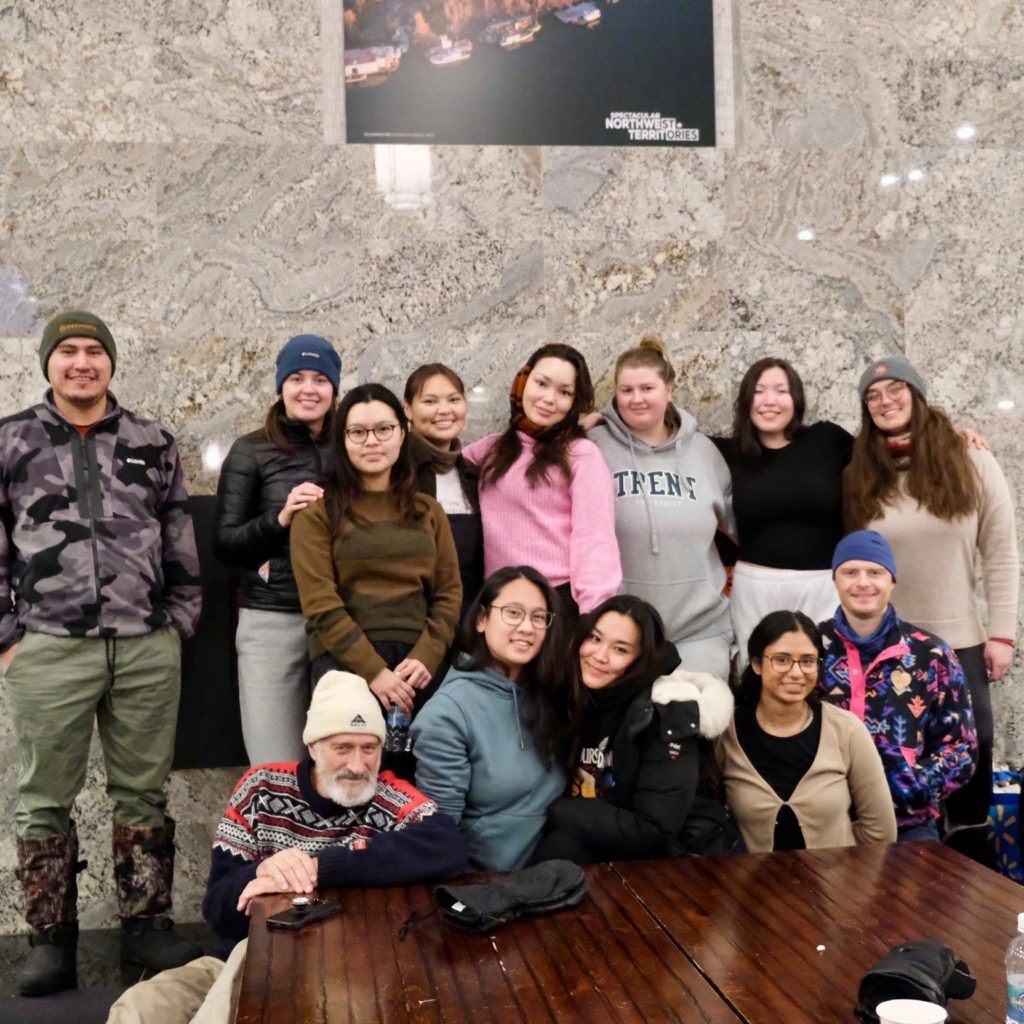
L to R: (top row) Randy Baillargeon, Tiana Lemon, Jody Tulurialik, Sierra Anderson, Juliane Aronsen, Amélie Aubrey Smith, Nivi Rosing, Francesca Bray, and (kneeling) Jon Isaacs, Sasha Rankin, Miyuki Daorana, Samreen Ahmad, Ian Laing.
